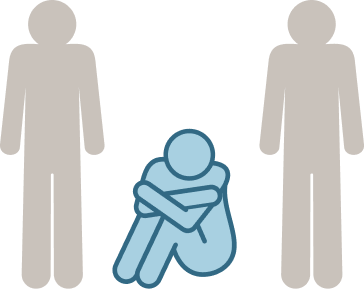
I find emotional well-being in good days when I can leave the house, engage in activities, and maintain an active lifestyle, which brings me joy amidst the challenges.
This experience was utterly devastating and heart-wrenching, leading to fears about the lifelong implications and the uncertainty of ever being able to eat normally again.
It’s also been hard to get into a routine with PS. With my Hickman catheter I get line infections, which result in hospitalizations.
SBS can negatively affect
interpersonal connections2
time with family and friends
According to an independent analysis, Patients with SBS
who are dependent on PS report relationship difficulties and
hesitancy toward companionship3
SBS can restrict the lives of those living with it, often leading to:
on enjoyable activities
maintaining relationships

Patients may be reluctant to engage in activities or relationships due to concerns of stigma3
Patients living with SBS may feel confined
by their condition3
Proximity3
- Patients may feel fear over unexpected bowel incidents
- This uncertainty can restrict patients from making travel plans
Productivity1,2,5
- Patients may have decreased opportunities for employment, or may be unable to return to work
- Patients with SBS often suffer from decreased work output and increased stress
SBS can be uncompromising for patients, and the demands required
of caregivers can be a detriment to their mental health1
Caregivers offer their time for the well-being of the patient, which can lead to personal difficulties.6
family members1,6
leading to lost earnings6

Due to the need for proper patient support, there may be advocacy groups that can benefit your patients



